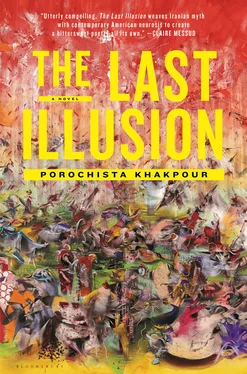He was his own mother. He knew how to clean a house by age four. He could cook by age five — eggs, cookies, pastas. He was riding the subway alone at age six. He was reading Shakespeare by seven and playing chess in Washington Square Park with old men by age eight. By age nine he’d had his first kiss, and by age ten and a half he had had something that resembled sex (both with the same neighbor girl, who was three years older). By the time he entered college — age fifteen — Hendricks knew his path: he wanted to study developmental psychology.
He was interested in children like himself: children who were different, children who were raised without parents, children who never quite got to be children, children who had made it. At first that was all. Then a story appeared in the newspaper: a girl in a remote part of Appalachia had been raised by horses. The abandoned girl, whose old parents were both too sick to take proper care of her, slept in a stable, galloped on all fours, whinnied, and ate only hay, apples, carrots, and sugar cubes. In the news they referred to her as “feral” and briefly talked of other children through history — fewer than a hundred, it was claimed — who had gone through the same: children raised by wolves and foxes and dogs and chimps. A month later, scientists found out the Appalachian horse girl was a hoax — a ploy by her impoverished farmer parents to get money for the media attention — but Hendricks had already stepped through the door the story opened: feral children. Fewer than a hundred, but still, they had existed.
Hendricks was in awe; this would be his subject, a subject no doubt few had wanted to take on. But it was immediately near and dear to him. After all, they were a science experiment science could never embark on, for one.
And — without getting into it all — and I know how this sounds — there’s something at the essence of their stories that I just-so-barely relate to, he told a professor once, who had tried to nudge him onto more traveled paths.
He went to Columbia University to live and breathe this, to take in what little there was to learn, and was amazed at how much one could make of so little, how brashly the most obscure exceptions spoke about the world and human nature. He never imagined being so seduced, so haunted, so moved, by something he was simply to study.
There was one other exception. It was during his senior year, while he feverishly wrote an honors thesis on feral children and furiously applied to graduate school for child psychology, that he met his future wife, a woman known as “Professor Batty,” a visiting poet, Nilou Batmanghelidj. He had decided to take her poetry class and had finally found something he was not good at.
What will it be this week, Tony? A girl raised by a unicorn? A boy raised by a griffin? she’d jab at him.
He spent way too much time in her office hours, agonizing about the form she preached — villanelles, sonnets, odes, sestinas. And she had relegated him to a B— student, the only B of his career. He knew he had to fight the grade, but not because of the usual.
Because of her .
She was beautiful. A tiny, sprightly woman, her frame was the only part of her that fit in at the college, as she was no bigger than a freshman really — otherwise her foreign name, her accent, even how she wore her jewelry and some of her clothes worked very much against that universe. Her face was all eyes, and what eyes, he marveled — pupil-less black globes surrounded all the way around by white, giving her the look of constant childlike surprise. She wore no makeup but the most perfectly lined red lipstick, and her long hair always hung in a tight braid down her back. She gave off the smell of honeysuckle and was always drinking tea, but a particularly fragrant tea, cup after cup, with cube after cube of sugar, which she often stirred with a thin delicate finger. She would wink at him to diffuse her eye rolls and smirks as he struggled, and she’d laugh a sort of husky schoolgirl laugh. Once she even threw a pen at him in part mock frustration and part frustration.
She was thirty-six. She did not know he was only nineteen, the youngest senior in the university’s history.
The one thing they worked on, really worked on, for extra credit, was a ghazal. He begged to know of poetry from her country one day, and she tried to laugh it off, Tony, why would the most American of American boys like you care? But she finally agreed (maybe, Hendricks thought, because she already knew why).
There was form involved with ghazals, lots of form, but also theme: love. His eyes brightened. She said, No, not just the kind you are thinking, but more than that. A love you can’t have. A love where the object of love is one you can never have. A love that is impossible.
His eyes lowered.
Well, you can imagine, with these Islamic mystics, the subject is obvious. Come on!
He looked up.
Ever heard of God , Tony?
Before he ever finished a ghazal — he started at least a half a dozen — he asked her out. Tony, you’re a child, she said, not even knowing how young he was, but she quickly corrected herself: Tony, I’m an old lady. What could a boy like you want from me?
He explained that when he was ten he could do things twenty-year-olds could. That put him at a much more acceptable age, he said, without saying what age exactly.
All he got back was a head shake and some nervous laughter that sounded like fine china chipping.
He had pointed out that she wore no ring. Perhaps there is someone, though?
She had denied it. And yet she had resisted, for several meetings, until the following fall, when, after he’d graduated but without fail still made regular appearances at her office hours, abruptly she gave in. Just so you know, your professor does not approve, she said, more soberly than she had intended.
They went to see Ben Hur. Afterward they had wine at her place. After many hours of arguing about the movie, politics, current affairs, history, Christianity, Islam — he leaned in to kiss her. That night, he told her his real age and she threw a fit, a huge fit, before melting into his kisses again and again. By the end of the night they were joking about it, in bed.
After a year of that they were engaged. After another year, they eloped. Hendricks was twenty-one.
They started trying to have children immediately, Nilou already thirty-eight. But as much as they tried, instead of a baby came pains, deep gripping pains throughout her body that were, she claimed, unlike any she had ever had. Something is wrong, Tony. Something is wrong, I know it.
And of course, he said what every lover would: he insisted everything was fine. He denied her concerns and yet encouraged her to go to a doctor, and when they went still he denied it, until the doctor spoke those words Hendricks replayed over and over from then onward, hoping to have them refiled and reassigned, so certain they were intended for someone else’s story: ovarian cancer.
She did not cry about the cancer — not once — but what she did cry about was what it precluded: children. She had waited her whole life— waited way too long, that I knew, but what can you do, a stranger in a new land —and now this.
She told him to leave her. That she would go back to Iran, be with her family, get help there. But he did not, and she did not.
Instead she lived as best she could, longer than anyone guessed, on loan with five-year extensions that started to look like forever, if it weren’t for the fact that evidence of decline, slowly but surely, was creeping in. When her end came, even though they had been prepared for it for years, it felt every bit as absurd and unjust. In her final days, she said to him, I only regret one thing, and it’s something you did. You never let me go back to Iran when I first got sick. And not so much for me — I mean, I left that damn place — but you. I would have loved to go to Iran with you, to show you everything.
Читать дальше












